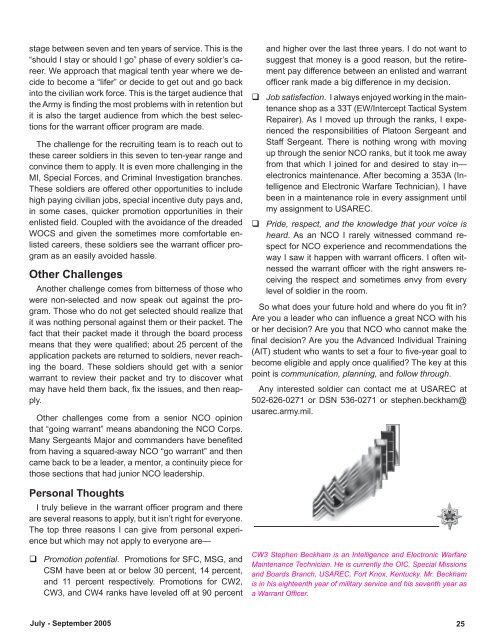Military Intelligence Professional Bulletin - Federation of American ...
Military Intelligence Professional Bulletin - Federation of American ...
Military Intelligence Professional Bulletin - Federation of American ...
Create successful ePaper yourself
Turn your PDF publications into a flip-book with our unique Google optimized e-Paper software.
stage between seven and ten years <strong>of</strong> service. This is the<br />
“should I stay or should I go” phase <strong>of</strong> every soldier’s career.<br />
We approach that magical tenth year where we decide<br />
to become a “lifer” or decide to get out and go back<br />
into the civilian work force. This is the target audience that<br />
the Army is fi nding the most problems with in retention but<br />
it is also the target audience from which the best selections<br />
for the warrant <strong>of</strong>fi cer program are made.<br />
The challenge for the recruiting team is to reach out to<br />
these career soldiers in this seven to ten-year range and<br />
convince them to apply. It is even more challenging in the<br />
MI, Special Forces, and Criminal Investigation branches.<br />
These soldiers are <strong>of</strong>fered other opportunities to include<br />
high paying civilian jobs, special incentive duty pays and,<br />
in some cases, quicker promotion opportunities in their<br />
enlisted fi eld. Coupled with the avoidance <strong>of</strong> the dreaded<br />
WOCS and given the sometimes more comfortable enlisted<br />
careers, these soldiers see the warrant <strong>of</strong>fi cer program<br />
as an easily avoided hassle.<br />
Other Challenges<br />
Another challenge comes from bitterness <strong>of</strong> those who<br />
were non-selected and now speak out against the program.<br />
Those who do not get selected should realize that<br />
it was nothing personal against them or their packet. The<br />
fact that their packet made it through the board process<br />
means that they were qualifi ed; about 25 percent <strong>of</strong> the<br />
application packets are returned to soldiers, never reaching<br />
the board. These soldiers should get with a senior<br />
warrant to review their packet and try to discover what<br />
may have held them back, fi x the issues, and then reapply.<br />
Other challenges come from a senior NCO opinion<br />
that “going warrant” means abandoning the NCO Corps.<br />
Many Sergeants Major and commanders have benefi ted<br />
from having a squared-away NCO “go warrant” and then<br />
came back to be a leader, a mentor, a continuity piece for<br />
those sections that had junior NCO leadership.<br />
Personal Thoughts<br />
I truly believe in the warrant <strong>of</strong>fi cer program and there<br />
are several reasons to apply, but it isn’t right for everyone.<br />
The top three reasons I can give from personal experience<br />
but which may not apply to everyone are—<br />
�<br />
Promotion potential. Promotions for SFC, MSG, and<br />
CSM have been at or below 30 percent, 14 percent,<br />
and 11 percent respectively. Promotions for CW2,<br />
CW3, and CW4 ranks have leveled <strong>of</strong>f at 90 percent<br />
and higher over the last three years. I do not want to<br />
suggest that money is a good reason, but the retirement<br />
pay difference between an enlisted and warrant<br />
<strong>of</strong>fi cer rank made a big difference in my decision.<br />
Job satisfaction. I always enjoyed working in the maintenance<br />
shop as a 33T (EW/Intercept Tactical System<br />
Repairer). As I moved up through the ranks, I experienced<br />
the responsibilities <strong>of</strong> Platoon Sergeant and<br />
Staff Sergeant. There is nothing wrong with moving<br />
up through the senior NCO ranks, but it took me away<br />
from that which I joined for and desired to stay in—<br />
electronics maintenance. After becoming a 353A (<strong>Intelligence</strong><br />
and Electronic Warfare Technician), I have<br />
been in a maintenance role in every assignment until<br />
my assignment to USAREC.<br />
Pride, respect, and the knowledge that your voice is<br />
heard. As an NCO I rarely witnessed command respect<br />
for NCO experience and recommendations the<br />
way I saw it happen with warrant <strong>of</strong>fi cers. I <strong>of</strong>ten witnessed<br />
the warrant <strong>of</strong>fi cer with the right answers receiving<br />
the respect and sometimes envy from every<br />
level <strong>of</strong> soldier in the room.<br />
So what does your future hold and where do you fi t in?<br />
Are you a leader who can infl uence a great NCO with his<br />
or her decision? Are you that NCO who cannot make the<br />
fi nal decision? Are you the Advanced Individual Training<br />
(AIT) student who wants to set a four to fi ve-year goal to<br />
become eligible and apply once qualifi ed? The key at this<br />
point is communication, planning, and follow through.<br />
Any interested soldier can contact me at USAREC at<br />
502-626-0271 or DSN 536-0271 or stephen.beckham@<br />
usarec.army.mil.<br />
CW3 Stephen Beckham is an <strong>Intelligence</strong> and Electronic Warfare<br />
Maintenance Technician. He is currently the OIC, Special Missions<br />
and Boards Branch, USAREC, Fort Knox, Kentucky. Mr. Beckham<br />
is in his eighteenth year <strong>of</strong> military service and his seventh year as<br />
a Warrant Offi cer.<br />
July - September 2005 25<br />
�<br />
�
















